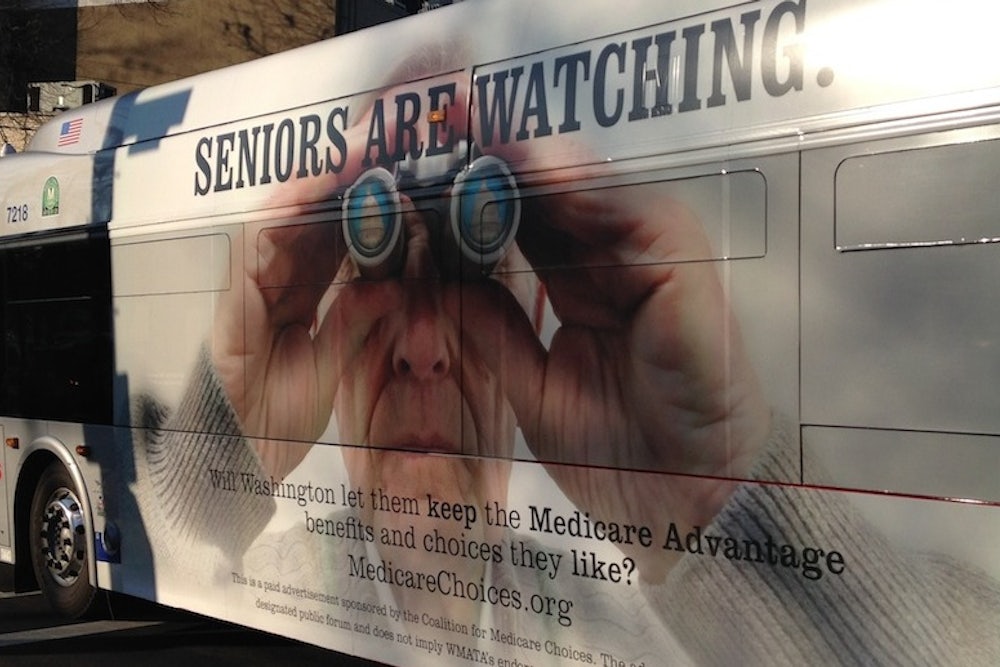Remember when Republicans found insurance company bailouts outrageous? Good, because the Republicans don’t.
On Friday, the Obama Administration announced proposed payment rates for Medicare Advantage plans, the private insurance option within Medicare. The federal government pays insurers a fixed fee for each senior they enroll. The program's goal is to provide seniors with more options and, ideally, foster competition that will lead to better management of care both within the traditional program and for those who get private insurance instead. But, for a long time, experts have said the federal government is actually paying the insurers too much—in other words, more than it costs to provide the same coverage through traditional Medicare.
In the late 1990s, when the program was known as "Medicare+Choice," the Clinton Administration attempted to rectify this by reducing insurer fees. But experts subsequently found the government was still paying the plans too much, so the Obama Administration and its allies included additional Medicare Advantage cuts in the Affordable Care Act—leaving discretion over the exact rates to the Department of Health and Human Services and its actuaries. On Friday, HHS revealed its calculations for next year’s rates, based in part on projections for how health care spending for the country as a whole is changing.
The payment formula is complicated and even now, with a weekend to digest the announcement, analysts aren’t entirely sure how insurers would react and what that would mean for seniors in the plans. (As Phil Galewitz of Kaiser Health News reports, many independent experts seem to think the effects would be pretty minimal.) But insurers, who say better benefits account for whatever extra funds they get, have warned that cuts of virtually any magnitude will force insurers to offer less generous benefits, charge higher premiums, or withdraw from the program altogether—as some of them did in the late 1990s, following those cuts the Clinton Administration implemented. The insurers are lobbying the administration to use its discretion to reduce the cuts or, ideally, eliminate them altogether. If you live in Washington and have seen those ubiquitous “Seniors are Watching” advertisements on billboards and buses, you have some idea of how strongly the insurers feel about this.
But insurers aren’t the only ones making a fuss. Republicans are too—and they have been for a while. As you may recall, Republicans pounced on the new Medicare Advantage cuts as proof that Obamacare was bad for seniors—in the 2010 midterms and then, again, in the 2012 presidential election. It was pure political gold, since seniors (particularly white seniors) were among those most skeptical of Obama and his health care law in the first place. Of course, House Republicans voted for the very same cuts when Paul Ryan's budgets had them. But that didn’t stop Republicans from attacking the cuts then—and it’s not stopping them now. “ObamaCare has already caused millions to lose the healthcare plans they liked, and now it is directly harming seniors who rely on the care they have through Medicare Advantage,” Eric Cantor, the House Majority Leader, said on Friday. “Our nation’s grandparents should not have to wake up tomorrow worried they no longer can access the care they want because of Obamacare.”
With this latest salvo, however, Republicans have actually found a way to be more hypocritical than before. For the last few weeks, Republicans and their allies have been in high dudgeon about Obamacare’s so-called risk corridor program, in which the federal government will subsidize insurers that take heavy losses for the next three years. Republicans and their allies have decried risk corridors as a "taxpayer bailout" of the insurers. But the policy justification for risk corridors is straightforward and, even to some conservatives, incontrovertible: They will ease the transition to a newly regulated insurance market, so that it's possible to provide universal coverage through a system of private plans. And unlike the additional Medicare Advantage payments, the risk corridor program might actually end up being a net boon to the taxpayers, since the government also shares in unexpected insurer gains. (The Congressional Budget Office has actually predicted as much, though, as with many such projections, there’s a lot of uncertainty there.)
Maybe Republicans think that's insufficient reason to pay the Obamacare insurers money—fine. But then how can they simultaneously insist government keep paying higher fees to Medicare insurers, given the case for them is a lot more dubious?
Congressional Democrats haven't exactly covered themselves in glory over this issue. New York Senator Charles Schumer was among the Democrats who signed a bipartisan letter to HHS, urging the administration not to harm beneficiaries with payment reductions, though the senators stopped short of calling for outright reversal of the cuts. But the current Republican position makes no sense whatsoever, unless the GOP's real priorities are (a) opposing anything the Obama Administration supports (b) sucking money away from the traditional, government-run Medicare program (c) stopping programs and spending that benefits the non-elderly uninsured. Readers can decide for themselves which of those explanations make the most sense—or whether, perhaps, it’s all of the above.
